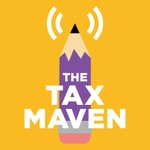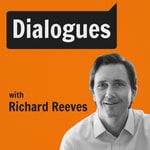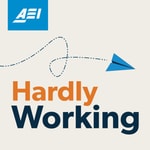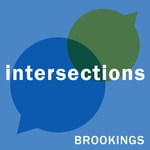The Tax Maven – Details, episodes & analysis
Podcast details
Technical and general information from the podcast's RSS feed.


Recent rankings
Latest chart positions across Apple Podcasts and Spotify rankings.
Apple Podcasts
🇩🇪 Germany - government
25/09/2024#94🇩🇪 Germany - government
24/09/2024#77🇩🇪 Germany - government
23/09/2024#55🇩🇪 Germany - government
22/09/2024#28
Spotify
No recent rankings available
Shared links between episodes and podcasts
Links found in episode descriptions and other podcasts that share them.
See allRSS feed quality and score
Technical evaluation of the podcast's RSS feed quality and structure.
See allScore global : 73%
Publication history
Monthly episode publishing history over the past years.
The Angel of Death Has a Tax Shelter to Sell You (Bill Gale)
Season 2 · Episode 8
mardi 22 décembre 2020 • Duration 08:54
Bill Gale is the Arjay and Frances Miller Chair in Federal Economic Policy and a senior fellow in the Economic Studies Program at the Brookings Institution. His research focuses on tax policy, fiscal policy, pensions, and saving behavior. He is co-director of the Tax Policy Center, a joint venture of the Brookings Institution and the Urban Institute.
Gale is the author of Fiscal Therapy: Curing America’s Debt Addiction and Investing in the Future (Oxford University Press, 2019). He has served as president of the National Tax Association and vice president of Brookings and director of the Economic Studies Program. He has also been an assistant professor in the Department of Economics at the University of California, Los Angeles and a senior economist for the Council of Economic Advisers under President George H.W. Bush.
Our student quote is read by Emily Eskin, from Teaneck, NJ.
Resources:
- Bill Gale’s bio.
- Bill Gale’s tweets.
- Fiscal Therapy: Curing America's Debt Addiction and Investing in the Future.
- The pencil question is about I.R.C. § 6033 (returns by exempt organizations).
- The student quote is from: Bridget J. Crawford & Emily Gold Waldman, The Unconstitutional Tampon Tax, 53 U. Rich. L. Rev. 439 (2019).
Diane Ring is from the Future (Diane Ring)
Season 2 · Episode 7
mardi 15 décembre 2020 • Duration 20:30
She writes about information exchange, tax leaks, international tax relations, sharing economy and human equity transactions, and ethics in international tax. Ring was a consultant for the United Nation’s 2014 project on tax base protection for developing countries, and the UN's 2013 project on treaty administration for developing countries. Ring is also co-author of three case books in taxation. Before entering academia, Ring practiced at the firm of Caplin & Drysdale and clerked for Judge Jon O. Newman of the Second Circuit Court of Appeals.
Our student quote is read by Sebastian from Whiting, New Jersey.
Resources:
- Professor Ring’s bio.
- Dan Shaviro’s blog post about Ring’s recent visit to the NYU Tax Policy Colloquium
- Shu-Yi Oei & Diane M. Ring, The Tax Lives of Uber Drivers: Evidence from Internet Discussion Forums, 8 Colum. J. Tax L. 56 (2017).
- Shu-Yi Oei & Diane Ring, Leak-Driven Law, 65 UCLA L. Rev. 532 (2018).
- More of Ring’s scholarship.
- The pencil question is from “When I Squeeze You with Eisphorai”: Taxes and Tax Policy in Classical Athens by Peter Fawcett
- The source for the student quote.
Does the IRS Monitor Your Credit Card Transactions? (Wei Cui)
Season 1 · Episode 8
mardi 29 septembre 2020 • Duration 18:57
Professor Wei Cui teaches at the Peter A. Allard School of Law. He also practiced tax law for over 10 years in both New York and Beijing, served as senior tax counsel for the China Investment Corporation and has served as a consultant to the United Nations, the Budgetary Affairs Commission of China’s National People’s Congress, and China’s Ministry of Finance and State Administration of Taxation.
Cui has been at the forefront of the effort to understand the opportunities and perils presented by the fast-moving effort to tax digital giants such as Facebook and Google. He explains how his focus on digital taxes grew out of a last-minute scramble to find a topic after a shift in the political winds rendered another moot. The result has been good for him and great for all of us as he has added much-needed light to a heated debate that at times has threatened to escalate into a trans-Atlantic trade war.
Cui also discusses his controversial work on third-party information reporting. He has questioned the importance scholars and policymakers often place on information as a source of strength for tax systems in developed economies. He makes a compelling case that the link between the two has long been misunderstood.
Our student quote by Aaron from College Station, Texas.
Resources
- Professor Cui’s bio.
- Dan Shaviro’s blog post about Cui’s visit to the NYU Law Tax Policy and Public Finance Colloquium.
- The paper Cui presented at the Colloquium, The Digital Services Tax: A Conceptual Defense
- Cui’s paper questioning the value of information reporting.
- Leandra Lederman’s response.
- The student quote is taken from John Marshall’s opinion in McCulloch v. Maryland, 17 U.S. 316, 431 (1819).
Thank God for Tax Day (Sara Greene)
Season 1 · Episode 7
mardi 22 septembre 2020 • Duration 16:55
Sara Greene is a Professor of Law at Duke. She received her JD from Yale Law School and her PhD in social policy and sociology from Harvard University in 2014. Greene also practiced housing law and tax credit matters at the law firm Klein Hornig in Boston.
Greene’s areas of expertise include consumer bankruptcy and debt, poverty law, housing law, tax, contracts, access to justice, and qualitative research methods. Greene’s research uses interdisciplinary methods to better understand the relationship between law and inequality. Her work has been published or is forthcoming in the New York University Law Review, the Duke Law Journal, the Minnesota Law Review, and the American Bankruptcy Law Journal, among others. Greene, along with others, integrated her research on the Earned Income Tax Credit into a federal policy proposal, “The Rainy Day EITC: A Reform to Boost Financial Security by Helping Low Wage Workers Build Emergency Savings.” Senators Cory Booker (D-NJ) and Jerry Moran (R-KS) adopted the proposal and are co-sponsors of a bipartisan bill proposing the “Refund to Rainy Day Savings Act.”
Our student quote by B. John Williams is read by Kuan-Ting from Taipei, Taiwan.
Resources
- Professor Greene’s bio.
- Daniel Shaviro’s blog post about Greene’s visit to the NYU Law Tax Policy and Public Finance Colloquium.
- The paper Greene presented at the Colloquium, “A Theory of Poverty: Legal Immobility”
- “The Rainy Day Earned Income Tax Credit: A Reform to Boost Financial Security by Helping Low-Wage Workers Build Emergency Savings”
- The Pencil Question article is Who's Naughty and Who's Nice—Frictions, Screening, and Tax Law Design, 61 Buff. L. Rev. 1057 (2013).
- The student quote is taken from an article in Tax Notes.
Redistributing Opportunity (John Friedman)
Season 1 · Episode 6
mardi 15 septembre 2020 • Duration 26:44
John Friedman is a Professor of Economics and International and Political Affairs at Brown. Collaborating with scholars such as Raj Chetty and Emmanuel Saez, Friedman works to provide very granular information on very big issues. He is a founding co-director of Opportunity Insights, where researchers and policy analysts work together to analyze new data and create a platform for local stakeholders to make more informed decisions.
An economist by training, Friedman uses the information collected by the IRS to tell researchers and the public whether and why the engines of opportunity we rely on actually deliver results. At the NYU Law Tax Policy and Public Finance Colloquium, Friedman presented work that he and his coauthors conducted about colleges and universities. That research “construct[ed] publicly available statistics on parents’ incomes and students’ earnings outcomes for each college in the US using de-identified data from tax records…. reveal[ing] that the degree of parental income segregation across colleges is very high, similar to that across neighborhoods.” Their work also shows that some schools (such as the State University of New York at Stony Brook) succeed in helping students who grew up poor gain upward mobility.
Today’s student quote is from Ha-Joon Chang's, 23 Things They Don't Tell You about Capitalism.
Resources:
- Professor Friedman’s bio.
- Dan Shaviro’s blog post about Friedman’s visit to the NYU Law Tax Policy and Public Finance Colloquium.
- The paper Friedman presented at the Colloquium, "Income Segregation and Intergenerational Mobility Across Colleges in the United States".
- The EITC article discussed in the episode, "Using Differences in Knowledge Across Neighborhood to Uncover the Impacts of the EITC on Earnings".
- The Pencil Question article is Darien Shanske, "Revitalizing Local Political Economy through Modernizing the Property Tax", 68 Tax L. Rev. 143 (2014).
- The student quote is taken from Ha-Joon Chang's 23 Things They Don't Tell You about Capitalism
Can you hear me now?: Why it’s so hard to deliver help to those who need it (Tatiana Homonoff)
Season 1 · Episode 5
mardi 14 avril 2020 • Duration 20:03
Tatiana Homonoff is an assistant professor of economics and public policy at NYU’s Robert F. Wagner School of Public Service. Homonoff received her PhD in economics from Princeton University. Her research focuses on identifying areas in which behavioral economics can improve public policy, primarily in the areas of tax policy, public assistance, and consumer finance. Homonoff has also served as a faculty fellow at the White House's Social and Behavioral Sciences Team (SBST).
Tatiana joined us at NYU Law to present a paper she co-authored with Jason Somerville, “Program Recertification Costs: Evidence from SNAP”, at the Tax Policy Colloquium hosted by my colleagues Daniel Shaviro and Lily Batchelder. That paper showed that “[c]urrent recipients [of the Supplemental Nutritional Assistance Program], who must complete a caseworker interview by recertification month end, are 20 percent less likely to recertify when assigned an interview at the end rather than the beginning of the month.” In other words, those needy individuals who happen to get assigned an appointment on the 25th are more likely to lose out on help the government wants them to have then those fortunate enough to have their interviews scheduled on the 5th of the month.
Today’s student quote comes from Mathias from Copenhagen, Denmark. His quote is from Juliane Kokott, advocate general at the Court of Justice of the European Communities. Mathias explains why he chose the quote: “Abbey National is a well-known EU VAT case….[T]he British tax authorities' position was that the financial definition in the directive did not matter for the tax definition of managing an investment fund…. AG Kokott disagreed and gave her opinion (which was largely followed by the Court) that the financial definition and the tax definition should be linked together.” Mathias adds “I completely agree with the quote, and I find it problematic that both Danish, European, and US tax rules contain many inconsistent and illogical definitions of the same terms. A simple US example is I.R.C. § 318(a)(1) where the subheading "Members of family" does not include brothers and sisters. Surely, brothers and sisters are included in many other legal definitions of "family" and in the common understanding of the words. It's bound to mislead people.”
How Old Is Tax Evasion? (Steve Bank)
Season 1 · Episode 4
mardi 31 mars 2020 • Duration 24:56
Steve Bank is the Paul Hastings Professor of Business Law at the UCLA School of Law. In this episode, he provides historical context for the rise of the key tax concepts of realization and recognition. He explains how the rise of Delaware as the place to be for corporations clashed with a young income tax to pose fundamental questions of when shareholders can be taxed.
The 1970s has long been known as the time when newspapers boasted countless ads promoting tax shelters. Bank’s research shows that those ads appeared much sooner. He also discusses the surprising populist uprising that spared banks from the obligation to withhold taxes that requires employers to set aside a portion of every paycheck. He shows that banks were not the only ones fighting against that broader approach to withholding, with letters from ordinary Americans overwhelming Congressional mailrooms.
This episode also features a recording by one of our students, Fernando from Guayaquil, Ecuador, of a quote that made him “open up [his] eyes and see why, from a US perspective at least, worldwide taxation makes total sense.”
[Although the first episode released after the COVID-19 pandemic, it was recorded earlier. Please note that while Steve Bank was in the studio, I was participating remotely, so my audio is sometimes less than perfect.]
Resources:
- Professor Bank’s UCLA Biography.
- Professor Bank’s scholarship.
- Daniel Shaviro’s blog post about Bank’s visit to the NYU Law Tax Policy and Public Finance Colloquium.
- The Pencil Question article: Miranda Stewart, “Global Trajectories of Tax Reform: The Discourse of Tax Reform in Developing and Transition Countries”, 44 Harv. Int'l L.J. 139 (2003).
- The Rockefeller case
- The student-read quote came from Mindy Herzfeld’s International Taxation in a Nutshell.
Do Your Taxes Like Nobody's Watching—Because Honestly, They Probably Aren't (Jeff Hoopes)
Season 1 · Episode 3
mardi 17 mars 2020 • Duration 23:06
Jeff Hoopes is an associate professor and the Harold Q. Langenderfer Scholar of Accounting at the University of North Carolina Kenan-Flagler Business School. Hoopes focuses on understanding how taxpayers respond to tax laws and changes in tax enforcement and uses his expertise to explain why. His work emphasizes the intersection of tax law, accounting, public economics, and finance.
In a world where we seem to know more and understand less every day, Professor Hoopes goes to the proverbial videotape to find answers. He works with the Internal Revenue Service to analyze actual tax return data to see how much of what we think we know squares with reality—and what he finds may surprise you. Hoopes and Dean talk about how to achieve the high tax compliance rates that everyone wants but nobody seems able to deliver.
This episode also features a recording by one of our students, Nicholas from New York, NY, reading a quote from Charles Dickens about the window tax, a tax that was intended as a tax on the ownership of luxury homes but prompted the landlords of tenement buildings to board up windows and build new ones without windows.
Resources:
- Professor Hoopes’s UNC biography.
- His personal website.
- Link to “Is Tax Planning Best Done In Private?”
- Daniel Shaviro’s blog post about Hoopes’s visit to the NYU Law Tax Policy and Public Finance Colloquium.
- The Pencil Question article: Edward J. Mccaffery, "The Holy Grail of Tax Simplification", 1990 Wisconsin Law Review
- The student-read Dickens quote can be found here.
Tax Policy and the 14th Century Fresco (Miranda Stewart)
Season 1 · Episode 2
mardi 3 mars 2020 • Duration 21:43
Miranda Stewart is a professor and the director of Tax Studies and the Tax Group at Melbourne Law School and also a fellow at the Tax and Transfer Policy Institute at Australian National University’s Crawford School of Public Policy. Her scholarship addresses an extraordinary range of topics related to tax policy, including transparency and economic development.
Her work takes up the challenge of envisioning tax laws that do more than just generate revenue. She sees those challenges depicted in a beautiful fresco painted by Ambrogio Lorenzetti in Siena Italy in the 14th century titled Allegory and effect of good and bad government. And painting may be just about the only thing Professor Stewart has not mastered: When she is not writing or teaching, she advises governments and think tanks about tax policy. Stewart and Dean talk about the connections she sees between how we govern ourselves and how we collect taxes.
This episode also features a recording by one of our students, Rommell from Metro Manila, Philippines, reading a quote from United States v. Murdock, 290 U.S. 389 (1933).
Resources
- Professor Stewart’s biography
- The Pencil Question article: Eric M. Zolt, "Prospects for Fundamental Tax Reform: United States vs. Japan," 83 Tax Notes 903 (1999).
- Professor Stewart’s contributions to The Conversation
- Professor Stewart's CV
- The case featuring the student-read quote: United States v. Murdock
Is More Open More Fair? (Kimberly Clausing)
Season 1 · Episode 1
mardi 18 février 2020 • Duration 30:47
If it is true that taxes are a reflection of our values, what signals are we sending? In this episode, we unpack the factors affecting job loss and creation, challenges faced by American workers versus other countries, and the vulnerabilities created by tax havens—and how to solve for them.
Harvard-educated economist Kimberly Clausing, the Thormund A. Miller and Walter Mintz Professor of Economics at Reed College, speaks with Steven Dean about these and other ideas explored in her new book, Open: The Progressive Case for Free Trade, Immigration, and Global Capital. She shares how this work was “born out of [her] despair following the 2016 election” and the trouble she had with messages from both the right and left concerning trade. Particularly in the wake of the 2017 changes to the tax law, Clausing champions effective solutions for American workers and the middle class. Her specific prescriptions address income inequality and economic insecurity through better-functioning markets that allow labor to share the fruits of economic progress. Clausing and Dean discuss the value of tax lawyers and economists working together at this important time for economic policy.
This episode also features a recording by an NYU Law student, Adam from Houston, Texas, reading a quote from one of the most famous tax cases, Gregory v. Helvering.
Congratulations to Professor Clausing on her announcement that she will soon be joining the faculty of the UCLA School of Law.
Resources
- Professor Clausing’s biography
- Open: The Progressive Case for Free Trade, Immigration, and Global Capital
- For more about Professor Clausing's recent visit to NYU Law: Professor Daniel Shaviro's blog post about the book event and TaxProf Blog's post about the event
- For the Pencil Question article, “The Curious Beginnings of the Capital Gains Tax Preference” by Ajay Mehrotra and Julia Ott
- The announcement of Professor Clausing's move to UCLA
- The case quoted by the student: Gregory v. Helvering







